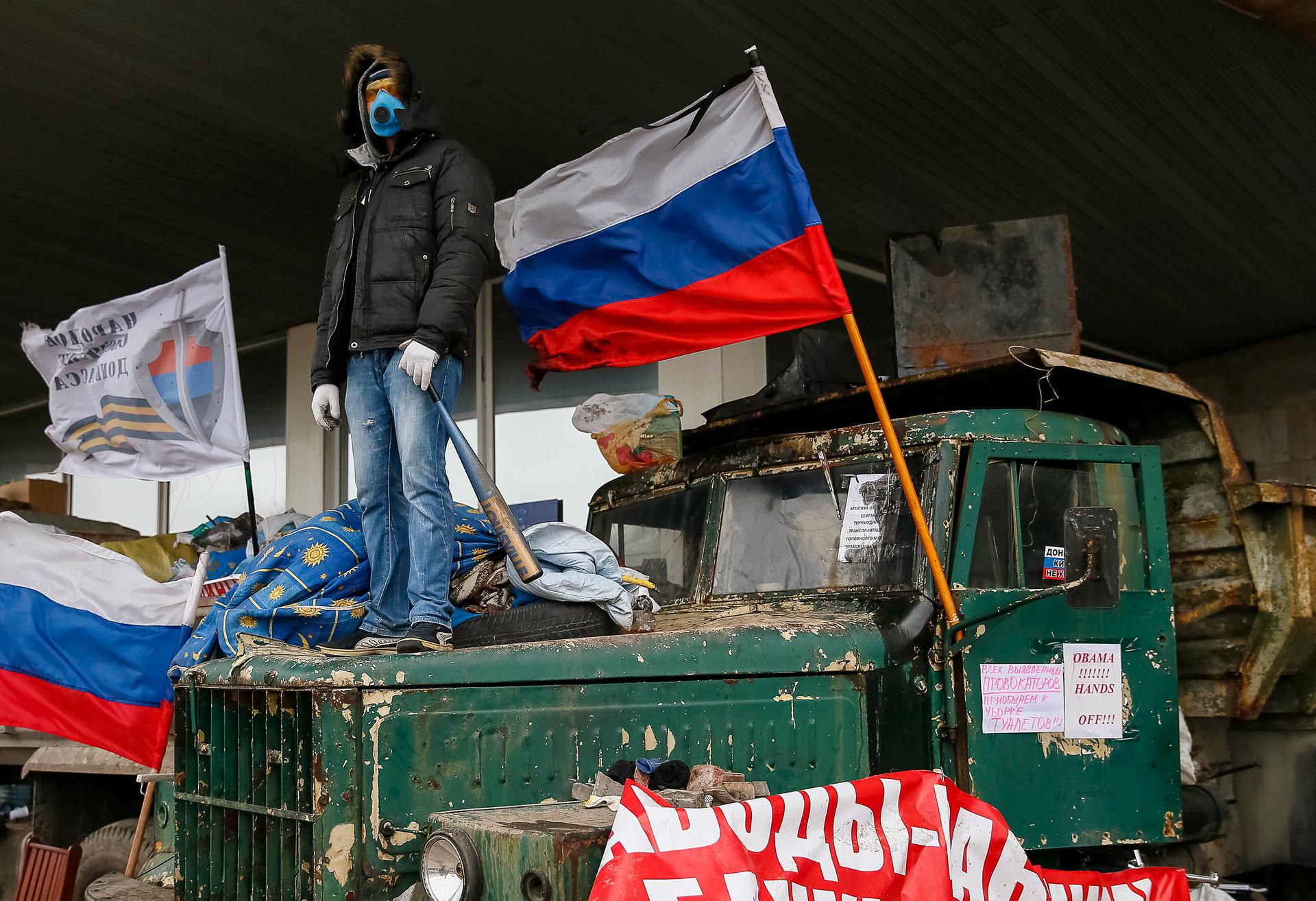Pro-Russian protesters dig in for a long fight over eastern Ukraine
A pro-Russia protester stands at a barricade outside a regional government building in Donetsk, in eastern Ukraine April 11, 2014.
The People's Republic of Donetsk. That's what protesters are calling the squatter's camp established in and around an 11-story government building in the heart of the eastern Ukrainian city.
This area is the center of protests in the largely Russian-speaking east that erupted when Kremlin-friendly Ukrainian President Viktor Yanukovych was overthrown in February. Pro-Russia activists have been squatting in the building for nearly a week.
Interim Prime Minister Arseniy Yatsenyuk visited Donetsk on Friday, seeking to calm discontent and preserve the country with a pledge to give more power to the regions.
"We must tell people that we know it's tough, but we know how in the future to secure jobs, increase salaries, attract investors, distribute more authority, and what to do so people are content with life,'' Yatsenyuk said.
Still, the standoff is becoming tense, according to the BBC's Temur Kighuradze.
"The government has patience, but it’s not endless. Yatsenyuk has stated that he might fulfil some of the demands of the protesters that include the protection of the Russian language in eastern Ukraine and he might also deliver more power to local authorities. But, of course, he refuses to give Donetsk any kind of independence or [allow it to pursue] joining Russia."
Kighuradze visited the protest camp on Friday.
"They are building up the barricades. They are using barbed wire. They are using tires. They are using sand bags, so they are prepared for the attack. According to Yatsenyuk and law enforcement, those people in the building have some kind of weapons, probably Kalashnikov rifles and some pistols."
Government forces are also preparing for a confrontation.
"They are prepared for the attack," said Kighuradze. They are just waiting for the command from the government."
The People's Republic of Donetsk. That's what protesters are calling the squatter's camp established in and around an 11-story government building in the heart of the eastern Ukrainian city.
This area is the center of protests in the largely Russian-speaking east that erupted when Kremlin-friendly Ukrainian President Viktor Yanukovych was overthrown in February. Pro-Russia activists have been squatting in the building for nearly a week.
Interim Prime Minister Arseniy Yatsenyuk visited Donetsk on Friday, seeking to calm discontent and preserve the country with a pledge to give more power to the regions.
"We must tell people that we know it's tough, but we know how in the future to secure jobs, increase salaries, attract investors, distribute more authority, and what to do so people are content with life,'' Yatsenyuk said.
Still, the standoff is becoming tense, according to the BBC's Temur Kighuradze.
"The government has patience, but it’s not endless. Yatsenyuk has stated that he might fulfil some of the demands of the protesters that include the protection of the Russian language in eastern Ukraine and he might also deliver more power to local authorities. But, of course, he refuses to give Donetsk any kind of independence or [allow it to pursue] joining Russia."
Kighuradze visited the protest camp on Friday.
"They are building up the barricades. They are using barbed wire. They are using tires. They are using sand bags, so they are prepared for the attack. According to Yatsenyuk and law enforcement, those people in the building have some kind of weapons, probably Kalashnikov rifles and some pistols."
Government forces are also preparing for a confrontation.
"They are prepared for the attack," said Kighuradze. They are just waiting for the command from the government."
Our coverage reaches millions each week, but only a small fraction of listeners contribute to sustain our program. We still need 224 more people to donate $100 or $10/monthly to unlock our $67,000 match. Will you help us get there today?
